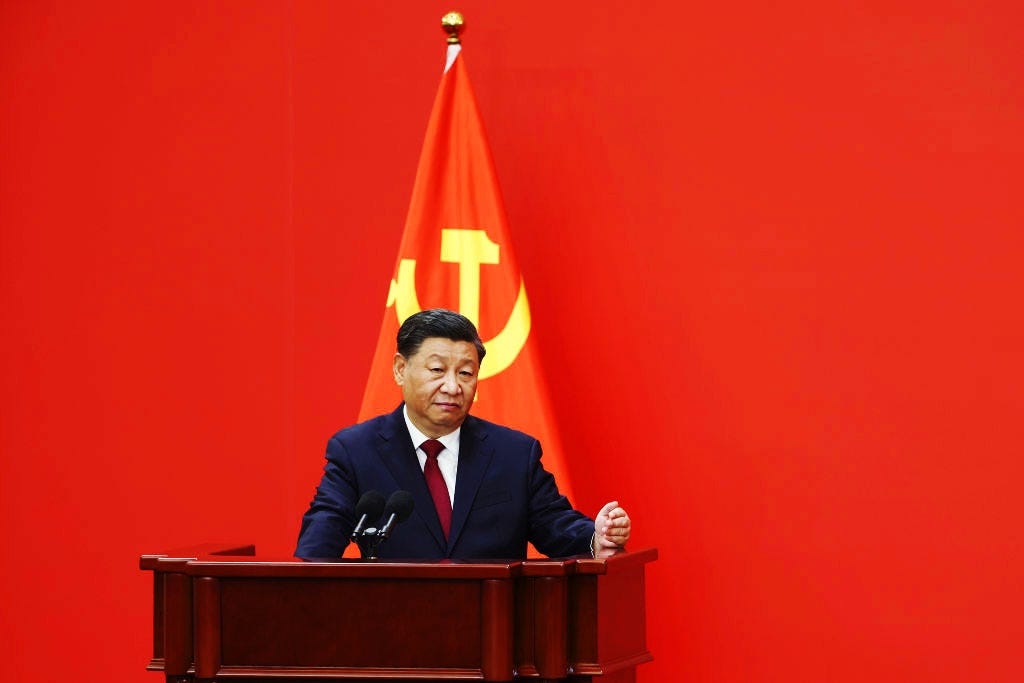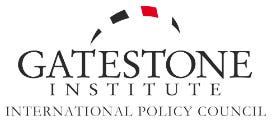Gordon G. Chang - OCT 22, 2023
What is the Communist Party of China up to?
Xi Jinping, who reveres Mao Zedong, is taking a page from his hero's "peasant revolution" playbook. Mao in 1949 prevailed over his enemy, Chiang Kai-shek's Nationalist government, by "encircling the cities from the countryside."
Ukraine, North Africa, and Israel, as Beijing sees it, are parts of the "countryside" today. So, what is the "city"?
The main enemy of the Chinese Communist Party (CCP) is the United States of America.
[T]he Party believes it must destroy the U.S. because of what America stands for. An insecure ruling organization in Beijing is worried about the inspirational impact of America's form of governance and values on the oppressed Chinese people. This means the United States will never have amicable relations with China as long as the Communist Party rules it.
Today... the Communist Party is waging proxy wars against America, such as Russia's campaign to annex Ukraine.... Splitting off Europe from America, in turn, would be another step in starving the U.S. Similarly, China is buying friends in, among other places, Latin America, the Caribbean and the Pacific Ocean as a means of further isolating America.
President Joe Biden is either unwilling or unable to defend the world from malicious Chinese communism. The catastrophic withdrawal from Afghanistan.... signaled that American policy was in collapse.
China's leader will continue to attack... especially as Biden pays what are essentially ransoms and thereby provides incentives for further disorder. The ransoms include the unfreezing of $6 billion in connection with a hostage swap with Iran... and the October 18th announcement of "humanitarian assistance" to Palestinians in Gaza and the West Bank, apparently to free Americans held by Hamas.
Allowing China, Russia and friends to take over areas is a critical — and probably fatal — mistake. Victories, for one thing, create momentum and the appearance of inevitability. Xi Jinping promotes the notion of the inevitability of Chinese rule as he tries to intimidate others into submission. China's successes just embolden the regime to press attacks.
How, then, does the United States confront China's proxy-war strategy? Washington can turn the tables on Xi by taking down Chinese proxies, thereby isolating Beijing and creating the appearance of Chinese failure.
Communist China is already overstretched. The primary driver of its four-decade rise, the economy, is in distress. The property sector accounting for at least a quarter of gross domestic product, is crumbling. Money is fleeing the country. GDP is growing nowhere near the 5.2% claimed for the first three quarters of this year—if it is growing at all. Imports, perhaps the best indicator of domestic demand, have now fallen for 12 straight months on a year-to-year basis.
[A]fter three decades of particularly naïve, indulgent, feeble, and otherwise misguided policy, Washington has no good options. The worst option of all is to continue policies that have created this disastrous situation.
America and the free world are running out of time.
America... is about to lose everything.
China is setting fires.
Chinese President Xi Jinping green-lighted Russia's invasion of Ukraine and is supporting that war with lethal and other assistance. In North Africa, Beijing, in conjunction with Moscow, has been fueling insurgencies that resemble wars. In the Middle East, China is backing Hamas's monstrous attacks on Israel.
Hamas fighters, for instance, appear to have Chinese-made weapons, presumably supplied through Iran. Moreover, the U.S. Navy in 2021 and this year seized Chinese weapons in transit to another proxy of the Islamic Republic, the Houthi militia in Yemen.
"Tehran for some time has distributed Chinese weapons to its terrorist proxies throughout the region," Jonathan Bass of energy consultant InfraGlobal tells Gatestone. "The Middle East, thanks in no small measure to Beijing, is soaked with blood."
What is the Communist Party of China up to?
Xi, who reveres Mao Zedong, is taking a page from his hero's "peasant revolution" playbook. Mao in 1949 prevailed over his enemy, Chiang Kai-shek's Nationalist government, by "encircling the cities from the countryside."
Ukraine, North Africa and Israel, as Beijing sees it, are parts of the "countryside" today. So, what is the "city"?
The main enemy of the Chinese Communist Party (CCP) is the United States of America.
The CCP declared a "people's war" on America in a May 2019 landmark editorial in People's Daily, the self-described "mouthpiece" of the regime. The CCP views the U.S. as an existential threat. As an initial matter, America stands in the way of Beijing from ruling tianxia, or "all under Heaven."
Moreover, the Party believes it must destroy the U.S. because of what America stands for. An insecure ruling organization is worried about the inspirational impact of America's form of governance and values on the oppressed Chinese people. This means the United States will never have amicable relations with China as long as the Communist Party rules it.
Today, therefore, the CCP is waging proxy wars against America, such as Russia's campaign to annex Ukraine, or backing Iran, which has for decades been calling for "Death to Israel" and "Death to America." Beijing's takeover of North Africa looks like an attempt to control the migration routes to Europe. Splitting off Europe from America, in turn, would be another step in starving the U.S. Similarly, China is buying friends in, among other places, Latin America, the Caribbean and the Pacific Ocean as a means of further isolating America.
The Chinese regime is not bashful in revealing overall strategy. "While in the countryside, the Communist Party mobilized the masses of peasants and established base areas, thus opening up a road of encircling the cities from the rural areas and seizing political power by armed force," states China.org.cn, a Chinese propaganda site, in "An Illustrated History of the Communist Party of China."
President Joe Biden is either unwilling or unable to defend the world from malicious Chinese communism. The catastrophic withdrawal from Afghanistan, completed in August 2021, signaled that American policy was in collapse. As a result, in the "countryside" there are many soft spots for Xi to attack.
China's leader will continue to attack them, especially as Biden pays what are essentially ransoms and thereby provides incentives for further disorder. The ransoms include the unfreezing of $6 billion in connection with a hostage swap with Iran — announced on the 22nd anniversary of 9/11 — and the October 18th announcement of "humanitarian assistance" to Palestinians in Gaza and the West Bank, apparently to free Americans held by Hamas.
Violence is already spreading. Hezbollah has attacked Israel from the north, and the Houthis launched missile and drone attacks from Yemen on the 19th. On October 18 and 19, militants hit American bases in Iraq and Syria.
Many, especially on the American right, believe the United States must conserve resources. They recommend, for instance, withdrawing support from Ukraine to ensure America can defend Taiwan. Similarly, the Biden administration did not lift a finger in North Africa in the past several months, ceding this crucial area to Beijing and Moscow.
Allowing China, Russia and friends to take over areas is a critical — and probably fatal — mistake. Victories, for one thing, create momentum and the appearance of inevitability. Xi promotes the notion of the inevitability of Chinese rule as he tries to intimidate others into submission. China's successes just embolden the regime to press attacks.
Momentum has been working against the United States for two years. Biden took the oath of office in a peaceful world. He then presided over a rapid collapse of the international system.
How, then, does the United States confront China's proxy-war strategy? Washington can turn the tables on Xi by taking down Chinese proxies, thereby isolating Beijing and creating the appearance of Chinese failure.
Communist China is already overstretched. The primary driver of its four-decade rise, the economy, is in distress. The property sector, accounting for at least a quarter of gross domestic product, is crumbling. Money is fleeing the country. GDP is growing nowhere near the 5.2% claimed for the first three quarters of this year — if it is growing at all. Imports, perhaps the best indicator of domestic demand, have now fallen for 12 straight months on a year-to-year basis.
Is confronting China risky and dangerous? Will doing so result in harm to America?
The answer to both questions is "yes," but after three decades of particularly naïve, indulgent, feeble and otherwise misguided policy, Washington has no good options. The worst option of all is to continue policies that have created this disastrous situation. Every course of action will be exceedingly risky.
Something has to be done, however. China is bleeding the United States and its friends.
America and the free world are running out of time. Mao in the late 1940s thought it would take him a decade to dislodge Chiang. As it turned out, he only needed about a year. Encircling the cities worked then. And it is working now.
America, therefore, is about to lose everything.
***
Gordon G. Chang is the author of The Coming Collapse of China, a Gatestone Institute distinguished senior fellow, and a member of its Advisory Board.
https://www.gatestoneinstitute.org/20080/china-encircling-america





